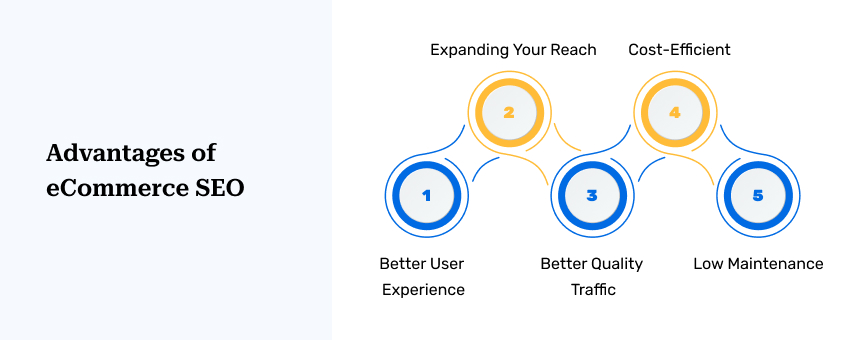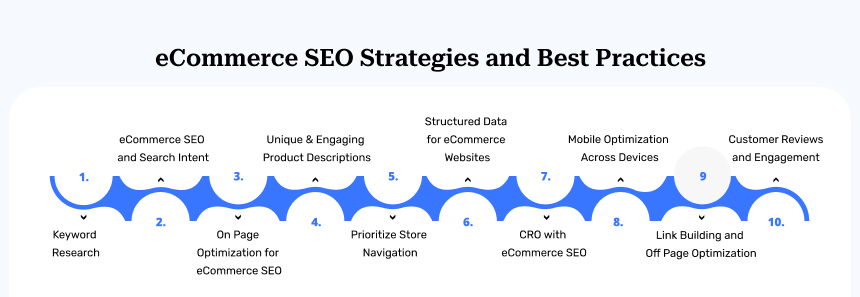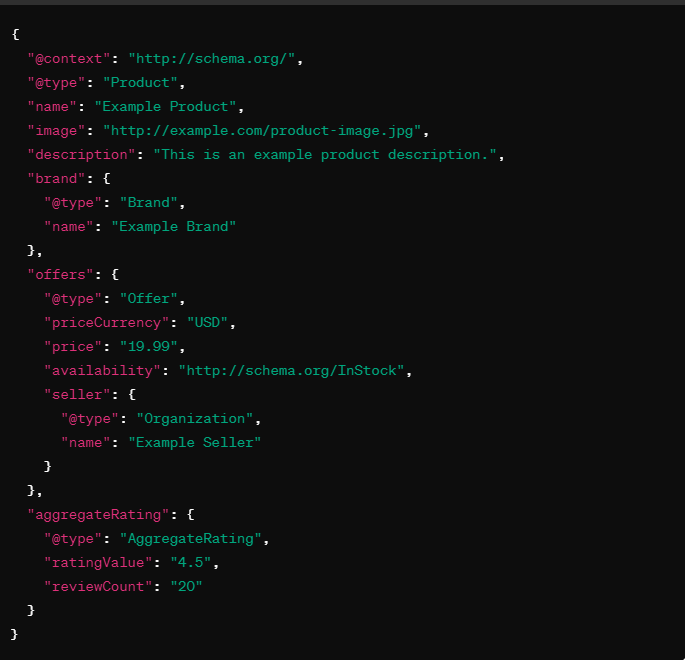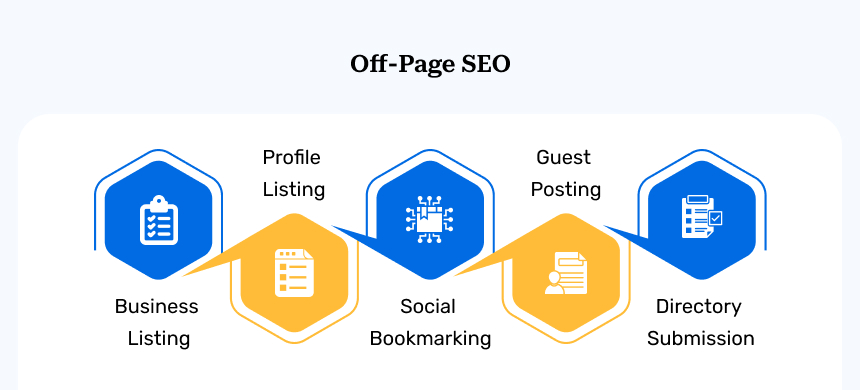When looking for new products online, 70% of people start with search engines (mostly Google).
It’s critical to practice methods that make your eCommerce website stand out, especially with the increasing competition among online shops.
One such tactic is SEO for eCommerce. Optimizing your website for SERP can increase its exposure and attract more potential clients.
In this article, we will discuss the top eCommerce SEO strategies in 2024, which will help you rank your products on search engine results pages and expose your brand to the target market.
So, let’s get started!
Table of Contents
What is eCommerce SEO?
eCommerce SEO is an online shopping technique that increases traffic to your store by making it visible on search engine result pages (SERPs). Since more people will visit a well-ranked page, you should aim for the highest possible ranking.
Unlike paid advertisements, which charge you per click to increase traffic to your online store, an SEO marketing strategy enables you to obtain highly relevant visitors almost free. SEO determines how well search engines—including Google, Bing, and Yahoo—rank your online store.
It’s critical to focus on the content of your online store if you want to increase SEO on a budget. You may enhance your eCommerce SEO strategy by creating thorough product pages for your online store, optimizing your product descriptions, starting a blog, or performing a technical website audit.
If you want your web pages to rank high in SERPs, you must ensure your website is optimized.
Maximize your visibility and drive organic traffic with our SEO services.
Why SEO is Important for eCommerce?
Implementing effective eCommerce SEO strategies provides many benefits for businesses seeking to thrive online. Here are some benefits of advanced eCommerce SEO:
-
Better User Experience
Increasing the visibility of your eCommerce platforms through SEO does more than just draw users; it also enhances their experience fundamentally.
Website navigation, content, and structure can all be optimized to help users discover the goods or information they need. Smooth navigation, pertinent content, and fast loading times create a better user experience.
It increases trust, satisfaction, and the chance of communication. Not only does it raise consumer satisfaction with user-friendly experiences, but it also benefits professional SEO services.
-
Expanding Your Reach
One of the greatest benefits of advanced eCommerce SEO is reaching a larger brand audience.
By strategically optimizing your product descriptions, meta tags, and keywords, you may increase your online store’s visibility to prospective buyers actively looking for similar products.
This increased visibility goes beyond geographical boundaries and opens up new markets and consumer segments for your eCommerce market solution.
-
Better Quality Traffic
eCommerce SEO strategies help to attract higher-quality customers to your online store.
Advanced eCommerce SEO ensures that your website is visible to potential clients actively looking for the goods or services you provide by optimizing for relevant keywords and user intent.
When creating the architecture framework of ecommerceplatform, it’s essential to prioritize user experience and ensure seamless navigation, which enhances both SEO performance and overall customer satisfaction.
-
Cost-Efficient
One of the eCommerce consulting services‘ main advantages is their affordability compared to conventional advertising techniques.
While SEO focuses on a natural presence in search results, sponsored advertising may be expensive. You can achieve long-term visibility by carefully optimizing your website and content without paying for paid advertisements.
With this economic SEO marketing strategy, businesses (mostly small businesses) may compete and prosper in the digital marketplace.
Low Maintenance
Unlike some marketing strategies that need ongoing observation and modification, eCommerce SEO strategy requires less upkeep after the initial optimization.
Although making changes and updates frequently is helpful, the core work guarantees a long-lasting online presence.
It implies that, with time, your eCommerce marketing website might eventually continue to draw visitors and produce revenue, offering a significant and long-lasting return on investment.
Elevate and dominate search engine rankings with our tailored SEO solutions.
eCommerce SEO Strategies and Best Practices in 2024
eCommerce SEO marketing strategy refers to the set of strategies and practices designed to enhance the visibility and ranking of eCommerce keyword strategy on search engine results pages (SERPs).
Here are key strategies and best practices to enhance your advanced eCommerce SEO in 2024:
1. Keyword Research
It is essential to comprehend all possible search terms that prospective buyers might employ to locate your store.
Your list of keywords will be the foundation for your SEO best practices for eCommerce sites. You’ll constantly consider fresh eCommerce keyword strategy.
Additionally, it’s a continuous process, particularly when you add new pages and products to your store. All new pages must do some new research because Google’s search trends are ever-changing.
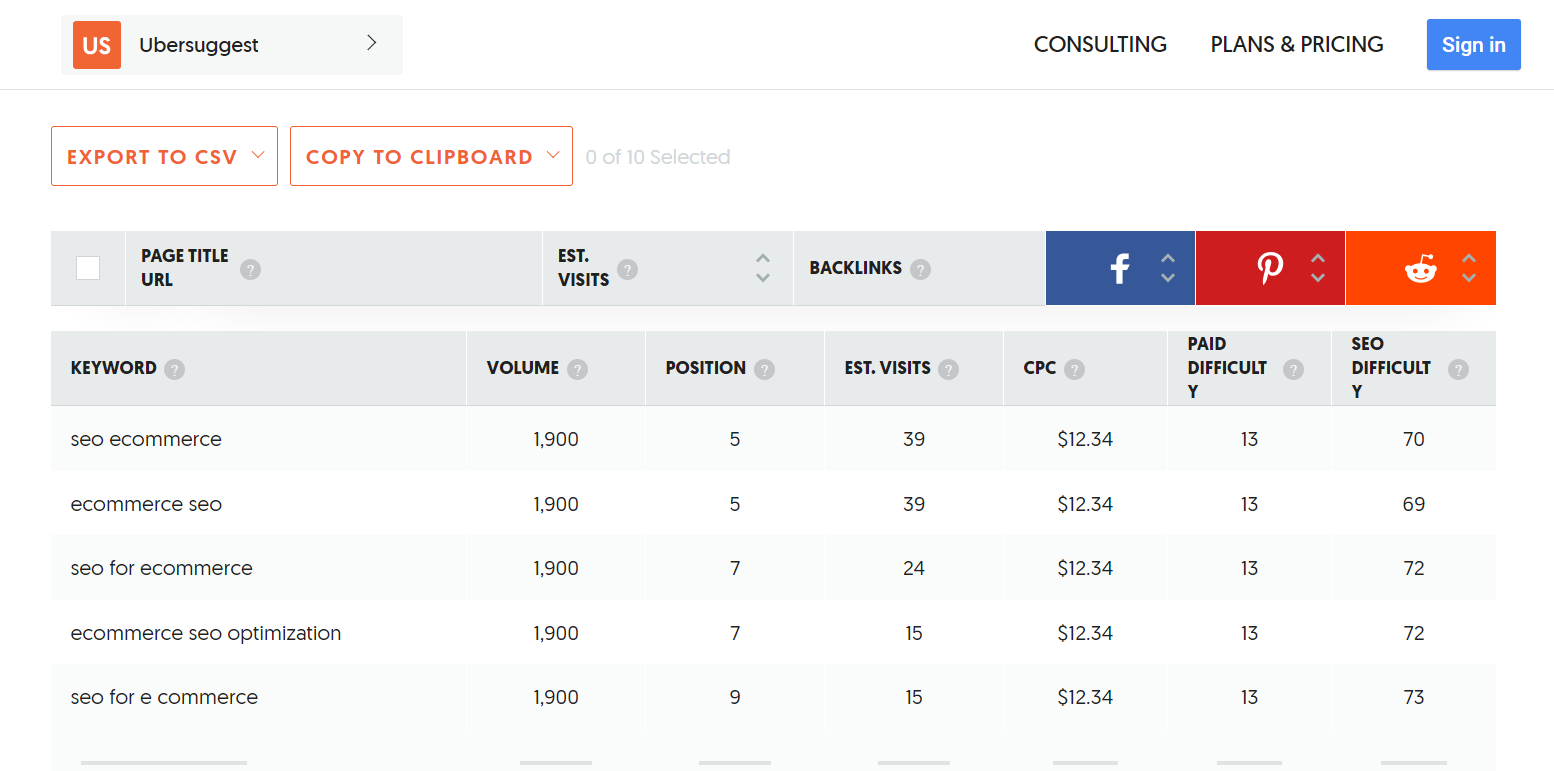
2. eCommerce SEO and Search Intent
Search intent refers to the theoretical knowledge or goal the searcher hopes to achieve due to their inquiry. Is the user searching for:
- Product pages for eCommerce sites?
- Pages for a particular product category?
- An article or purchase guide?
Consider what content a user would seek while searching for the “x” phrase. Additionally, look up the keyword on Google and see what comes up.
Your search intent is likely incorrect if you’re attempting to rank a product page for a phrase for which Google displays all categories.
Understanding search intent, spotting relevant keywords with eCommerce intent, and raising your site’s search engine ranks for those keywords are the three main components of SEO for eCommerce.
All research must consider the keywords’ intended search purpose before choosing which ones to target. When conducting keyword research for eCommerce websites, you should search for eCommerce intent. Building a solid eCommerce SEO marketing strategy requires knowing the proper and long-tail keywords with an eCommerce purpose.
3. On-Page Optimization for eCommerce SEO
Optimization includes creating, formatting, and organizing on-page elements, including headers, title tags, meta descriptions, and content. This procedure aims to improve the page’s search engine ranking for particular keywords.
Some choose to compile an extensive list of keywords for the entire website, containing anywhere from 10 to several hundred terms. However, depending on the extent of the anticipated SEO work, this strategy might or might not be advantageous.
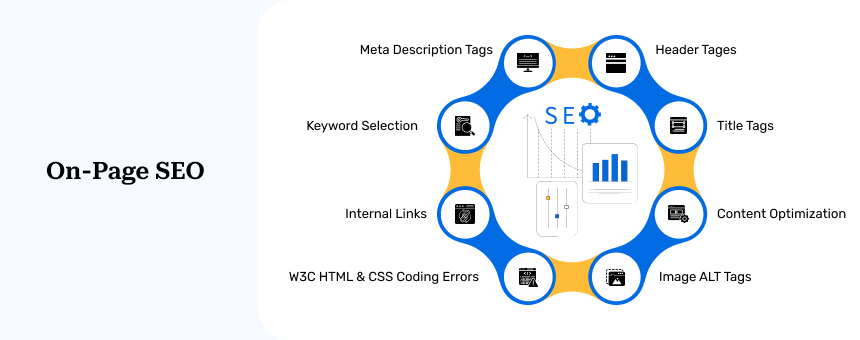
For example, let’s say the page in question is a Loreal product page. The core keyword in that scenario might be “Loreal Shampoo for sale,” and the secondary keyword may be “Loreal instant clear shampoo.” Relevant terms from the LSI may also include “color protection,” “anti-hairfall,” “gold shampoo,” and more.
4. Unique & Engaging Product Descriptions
Writing distinctive product descriptions that build your brand, engage your audience, and inform your shoppers is one of the most fundamental yet frequently disregarded eCommerce strategies.
It will help you differentiate your eCommerce implementation services from the competition in a way that matters to search engines and your customers.
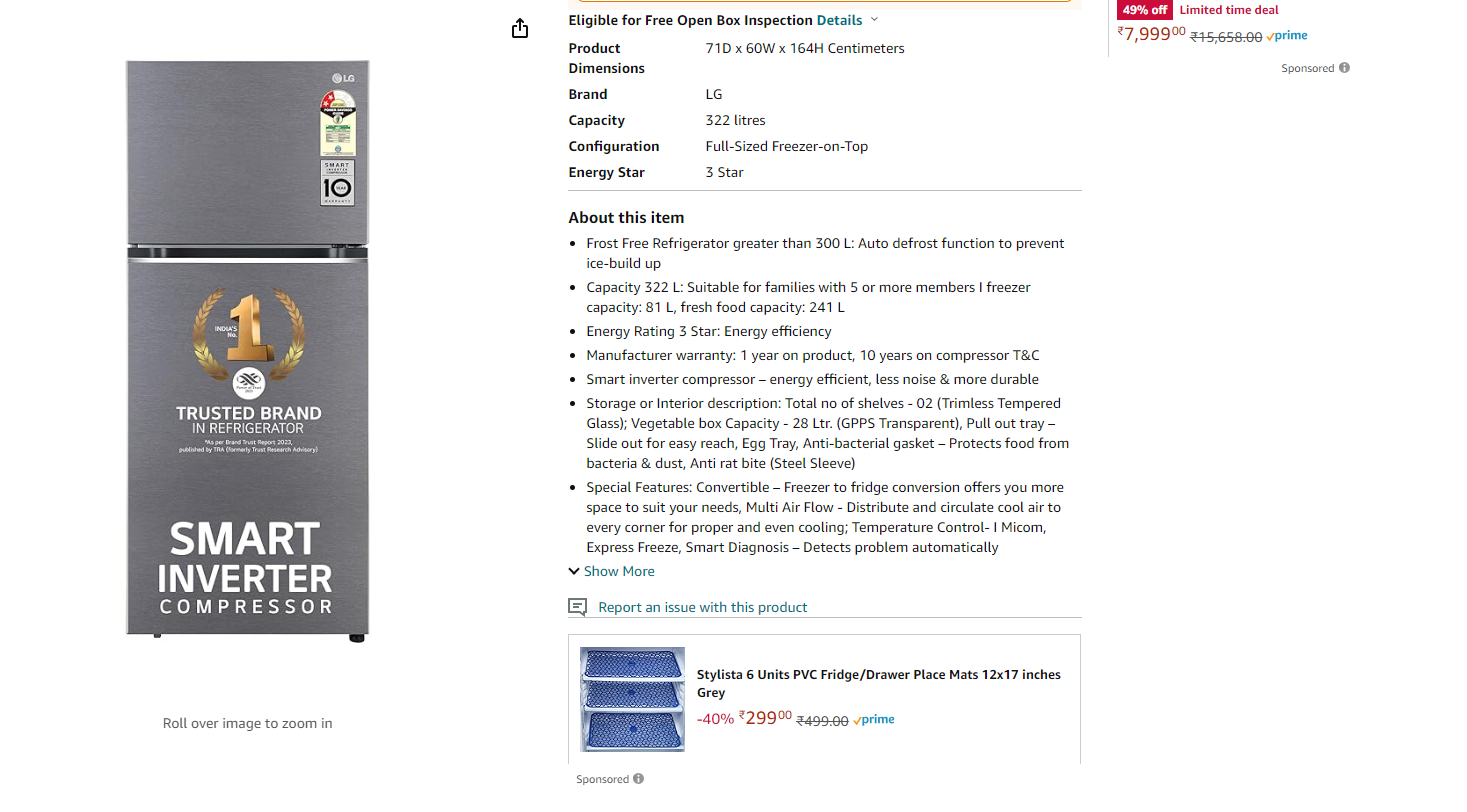
You may improve your organic rankings by creating distinctive and captivating product descriptions optimized with your target keywords, regardless of whether you’re the only provider or your products are available elsewhere.
5. Prioritize Store Navigation
Despite its importance, user experience is still an underappreciated component of modern eCommerce stores.
Creating a website that is easy to use and browse is crucial, especially on mobile devices. The secret is to make the process from the home page to checkout easy and uncomplicated.
This strategy will raise your organic visibility while also increasing your conversion rate. Usability and site navigation are important since Google tracks whether users revisit your site and return to search engines.
Google will assume your website is not the ideal place to send traffic if it appears high in search results, but users will return to Google to locate a better site.
6. Structured Data for eCommerce Websites
Structured data, or schema markup, is vital to eCommerce SEO. It provides search engines with comprehensive information about product pages.
By integrating structured data, businesses may convey important details like product names, prices, availability, and reviews, which makes it easier for search engines to comprehend and display material.
It generally improves eCommerce listings’ exposure and makes it easier for rich results—like product snippets and star ratings—to be displayed on search engine results pages (SERPs).
This calculated move makes for a more engaging and educational search experience, which raises the possibility of getting clicks and making an impression in the crowded digital market.
Here’s an example of structured data (JSON-LD format) for a product on an eCommerce website:
7. CRO with eCommerce SEO
The goal of CRO is to increase the conversion rate of this incoming traffic by concentrating on the post-click experience and using analytics and user input to improve and personalize the online interface.
Combining SEO and CRO results in a dynamic strategy. SEO draws in potential customers by making sure your site appears and looks good in search results, and CRO ensures that once these prospects are on your site, their experience is optimized for maximum engagement and conversion.
In 2024, these SEO best practices for eCommerce sites will combine to form a smooth, captivating, and highly customized user experience that will appeal to visitors and persuade them to remain, interact, and eventually convert—all while precisely meeting the evolving expectations of contemporary customers.
8. Mobile Optimization Across Devices
Optimizing your website for mobile devices has grown significantly annually for a decade. If you manage an online store, the mobile experience should take priority over the desktop experience. This involves building a website that adjusts to the screen size of the device viewing it.
Google has also transferred to a mobile-first index, which has significantly influenced eCommerce SEO strategies. If Google prioritizes the mobile experience, you should also make sure to prioritize it for your eCommerce store.
It implies that Google gives your mobile website a higher position than your desktop website when determining website rankings. You must prioritize the mobile experience, as most eCommerce customers either begin or complete online transactions. Site speed and usability on mobile devices are as crucial as desktop computers.
A smart place to start is to enter your website into Google’s Mobile-Friendly Tester tool.
9. Link Building and Off Page Optimization
Link building and Off-page optimization are essential eCommerce SEO strategies that support a website’s authority and reputation.
Link building is essentially obtaining hyperlinks from other reliable websites that point back to your own. These hyperlinks act as votes of confidence or endorsements in search engines like Google.
The strategy is related to off-page optimization, which goes beyond the structure and content of your website to include actions taken outside of it to improve user experience and search engine exposure.
Cultivating high-quality backlinks, promoting on social media, monitoring online reviews, and maintaining local listings are all examples of successful off-page SEO strategies.
With the combination of these strategies, you can improve your website’s exposure and ranking on search engine results pages (SERPs), build the site’s reputation, and share a signal to search engines that it is a reliable and authoritative source in its industry.
10. Customer Reviews and Engagement
Customer reviews and engagement are the essential part of eCommerce SEO best practices.
To offer insightful comments, encourage your customers to write sincere, thorough reviews. This will not only improve your website’s exposure but also enhance its visibility and credibility in search engine results.
Search engines like Google prioritize user-generated content, considering it a marker of a business’s reliability and relevance.
Moreover, replying to reviews—whether favorable or unfavorable—shows potential customers that your company is dedicated to their needs and may weigh in on their choices.
In addition to strengthening the sense of community and trust surrounding your business, this engagement strategy uses the SEO advantages of regularly updated, keyword-rich content to increase organic traffic to your website.
Enhance your online business with our industry-leading SEO services.
The Bottom Line
With eCommerce web design services evolving in 2024, adapting SEO strategies and incorporating industry best practices is more crucial than ever.
Focusing on real, high-quality content, graphics, and photos will ensure that you won’t lose your Google ranks even after the most recent revision to the Google Spam Report. Use Google Shopping and Google Business Profile to harness the power of local inquiries and improve your rankings in local search results.
As one of the top SEO companies in India for internet marketing, we at PixelCrayons have examined the majority of the aforementioned strategies and best practices on both our own and our clients’ websites.
If you are considering an SEO audit or long-term SEO strategy for your marketplace or eCommerce website, contact us for our eCommerce website development services consultation.

